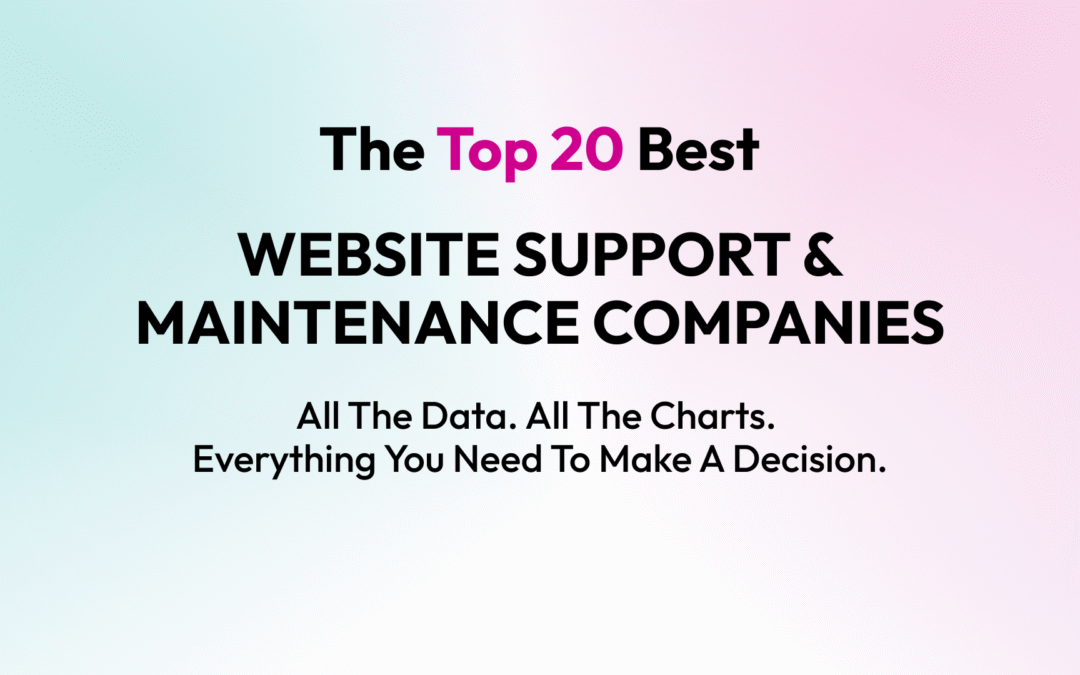This is a side by side comparison of the top 20 website support and maintenance companies and all the statistics we use when we’re trying to figure out how best to compete with them.
We get customers because companies are paying for lead generation or investing in their websites in other ways, they go cheap on support, and learn the hard way what a hacked site, contact form that hasn’t been working for a month, or day-long downtime event actually costs.
My team and I have spent the last few days researching website maintenance companies because that’s who we compete with at SupportMy.Website. I analyzed pricing structures, service offerings, customer reviews, and specialization levels across 20+ leading providers. I actually thought there were going to be more leaders out there, but apparently not. So, whether you’re running a small WordPress site or managing enterprise infrastructure across multiple platforms, this guide should help you make a smarter decision.
Can’t set it and forget it with a website
Your website isn’t something you can just put on autopilot if you’re driving traffic to it. I’ve seen too many businesses learn this lesson expensively.
The reason is what’s happening behind the scenes:
- WordPress is releasing 3 to 4 major updates a year, plus constant plugin and theme updates
- Over 2,200 WordPress plugin vulnerabilities/exploits (places where they can be hacked) were reported in 2024
- Search engines actively penalize slow, outdated, or insecure websites (you can check your page speed here)
- Every minute of downtime costs companies money
- Technical debt accumulates fast when you skip updates, potentially making future fixes exponentially more expensive
Professional maintenance handles this proactively. If you don’t have an inhouse team, the question isn’t whether you need it or not, it’s which provider is right for you.
How I evaluated these companies
My team and I researched each company in late November 2025 and looked at:
- Pricing transparency and structure across all published tiers
- Service scope and specialization level (pure maintenance specialists vs. agencies dabbling in maintenance)
- Customer satisfaction ratings from Clutch, Trustpilot, Google Business, G2, and Facebook
- Response time commitments for critical issues and emergencies
- Years in business and market positioning
- Technology platform support (WordPress-only vs. multi-platform)
- Geographic coverage and support hours
Companies are organized by pricing tier because that’s what most directly reflects the service level you’ll actually get. Within each tier, specialization varies significantly. Some companies do nothing but maintenance, while others treat it as a side offering.
Also, for complete transparency, we did do our first round of reviews and checks using a research project on Claude. You can see our initial research here. We started off with 24 or 25 companies, but some were out of business and others didn’t actually fall into our category here.
The complete comparison table
Here’s the link to my google sheets file as well if you want to see it outside of the website.
Understanding the three tiers
Premium Tier ($110-$900+/month)
Premium providers target businesses where website uptime directly impacts revenue. If your site goes down during peak hours and you’re losing thousands per hour, this is what you’re looking for. This also happens to be us here at SupportMy.Website.
What you actually get:
- Dedicated account managers who know your business
- Sub-1-hour response times for critical issues
- Comprehensive analytics and business intelligence reporting
- Enterprise security certifications (SOC 2, ISO 27001)
- Performance guarantees with SLA credits
- Proactive optimization recommendations
- Executive-level reporting and quarterly business reviews
Who should choose premium:
- Companies treating their website as a primary revenue driver
- E-commerce sites where downtime costs real money
- Enterprise companies with compliance requirements
- Businesses with complex, multi-platform technology stacks
- Organizations requiring predictable, white-glove service
Key players:
Support My Website (that’s us) supports five platforms including WordPress, Drupal, Joomla, and Expression Engine. Most competitors only do WordPress. Our 25 years of combined parent company experience and transparent pricing from $110 to custom enterprise plans show we’ve figured out how to deliver this consistently. We’ve got a 4.8/5 Google rating and we focus on comprehensive analytics reporting that actually helps you make business decisions.
SiteCare has built a 20-year legacy exclusively on WordPress maintenance. Their 4.9/5 on Clutch (26 verified reviews), SOC 2 Type II certification, and performance guarantees (100% uptime, guaranteed “Good” Core Web Vitals or free month) justify their $120-$2,190 pricing range. They do a great job and are coincidentally just 70 miles from us. Weird that the top two providers worldwide would be so close!
Newt Labs serves the UK market with 15 years of experience and a perfect 5.0/5 Google rating. Pricing runs £79-£479 monthly. They’ve acquired multiple competitors, which signals they’re consolidating expertise and market share.
Mid-Tier ($39-$347/month)
If you’re just getting going and don’t need analysis, reporting, analytics, and help improving your website or driving more traffic, this is where you should start. You’ll get professional maintenance without the frills.
What you get:
- 24/7 monitoring and emergency support (from most providers)
- Daily to 4x daily backups with offsite storage
- Security monitoring and malware removal
- Plugin and core updates with compatibility testing
- Monthly reports covering uptime, security, and performance
- Developer time banks (60-180 minutes) or unlimited task submission
- Response times of 1-4 hours for critical issues
Who should choose mid-tier:
- Businesses outgrowing DIY maintenance but aren’t really making much money from their sites
- Small to medium businesses with standard WordPress sites
- Companies spending $50-200/month who need reliable support
- Agencies needing white-label maintenance for clients
Standout providers:
WP Buffs ($79-$347/month) schedules updates during your lowest traffic periods and includes premium plugins (WP Rocket, iThemes Security Pro) that cost $200+/year separately. Their partnerships with Kinsta, WP Engine, and SiteGround demonstrate deep WordPress ecosystem integration.
FixRunner achieved 5.0/5 across 242 Trustpilot reviews—that’s impressive at scale. Their 1-hour response guarantee, global 24/7 team, and transparent task tracking starting at $59/month represent outstanding value. They specialize in WooCommerce.
WP Tech Support ($55-$175/month) resolves critical issues in 1-2 hours with 60-second response for site downtime. Their monthly developer time banks (60-180 minutes) provide predictable costs for businesses needing occasional custom work.
WP Tangerine ($197-$997/month) pioneered the unlimited task submission model with 1-hour caps per task. Their 4.7/5 Trustpilot rating (229 reviews) and dedicated developer/designer per client deliver premium service at budget pricing.
GoWP uniquely targets agencies with white-label maintenance starting at $39/month per site. Content Edits run $99/month with 30-minute turnaround, and they offer dedicated roles (developer, copywriter, designer) at $1,099+/month each. Their Visual Validator tool and 1,900+ member agency community create network effects competitors can’t match.
SkyrocketWP bundles Kinsta WordPress hosting (normally $35+/month standalone) in their $39/month Basic plan. That’s exceptional value—you’re getting $70+ in services for $39.
WP Runner supports multi-platform websites (not just WordPress) starting at $119/month with unlimited support. Based in Brisbane with global coverage, they complete most work within 24 hours and include conversion rate optimization.
Budget-Friendly ($12-$199/month)
Budget providers are great for price-sensitive customers, solopreneurs, and simple sites requiring basic maintenance.
What you get:
- Daily backups (some require add-ons for offsite storage)
- Basic security monitoring (often plugin-based)
- Core and plugin updates
- Email-based support
- Monthly reports
- Response times of 24-48 hours for non-critical issues
Who should choose budget-friendly:
- Personal blogs and portfolio sites
- Startups with tight budgets and simple WordPress sites
- Sites with low traffic where occasional downtime is acceptable
- Those testing maintenance services before committing premium spend
Notable options:
BionicWP starts at $11.90/month with managed hosting included, container-based isolation for security, and 90+ guaranteed Google PageSpeed scores. Their Unlimited Edits add-on at $15/month and white-label inbox management for agencies create flexible options.
WP Fix It disrupts traditional maintenance with pay-per-incident pricing: $47 for site fixes, $167 for speed optimization. They’ve handled 350,000+ support tickets since 2009, though their 3.9/5 Trustpilot rating shows service inconsistency at that volume.
Specialist Website Support & Maintenance vs. Agency
Specialists consistently outperform agencies on maintenance metrics, because that is all they do all day every day.
Pure WordPress maintenance specialists (16 of 20 companies) dedicate their entire business to maintenance. These companies demonstrate:
- Maintenance infrastructure
- Teams trained exclusively on maintenance workflows
- Faster response times (1-4 hours vs. 24-48 hours for agencies)
- Higher customer satisfaction ratings (average 4.5-5.0/5 vs. 3.5-4.0/5)
- Transparent maintenance-specific pricing
If you’re wondering, the data backs this up. Total WP Support achieved 5.0/5 across 24 Google reviews, FixRunner maintains 5.0/5 across 242 Trustpilot reviews, and SiteCare holds 4.9/5 on Clutch. All pure maintenance specialists.
Nothing against full-service agencies. I own a separate company that for many years was a full-service agency, but it’s just not the same as having a whole infrastructure dedicated to great website support and maintenance.
Why Am I Sharing All My Competitors?
Well, first off, there’s AI thing sweeping the world and anyone can look this stuff up themselves pretty quickly these days, so it’s not a secret. And besides, I would rather you saw it here than just on ChatGPT. Next, we are really, really good at this stuff and it doesn’t bother me one bit to show everyone else. There are great competitors out there and I encourage you to take a look at all of them.
But if you want a company that’s going to be there for you over the years (we’ve been around for 25 years now) and think critically about your site, your business, and how to make you more money, that’s us. And that’s usually what our customers want and need. I hope you do as well!
Author:
Jason Long, CEO

Jason Long is the founder and CEO of JHMG and SupportMy.Website. He is a serial problem solver and entrepreneur with 25 years of experience in business building. Jason’s ventures range from agriculture to healthcare with a focus on web-based technology. He has extensive experience in software development and have operated as a developer, UX designer, graphic designer, project manager, director, executive coach, and CEO. At JHMG, he operates not only as the leader of the organization, but also as a SaaS Consultant helping businesses start, build, grow, scale, and exit their SaaS businesses.
Jason is also an experienced world traveler who regularly visits destinations worldwide, and is passionate about community growth, social issues, fitness, and family.
Jason Long’s Linkedin
Website: JasonMLong.me
X: @jasonmlong
